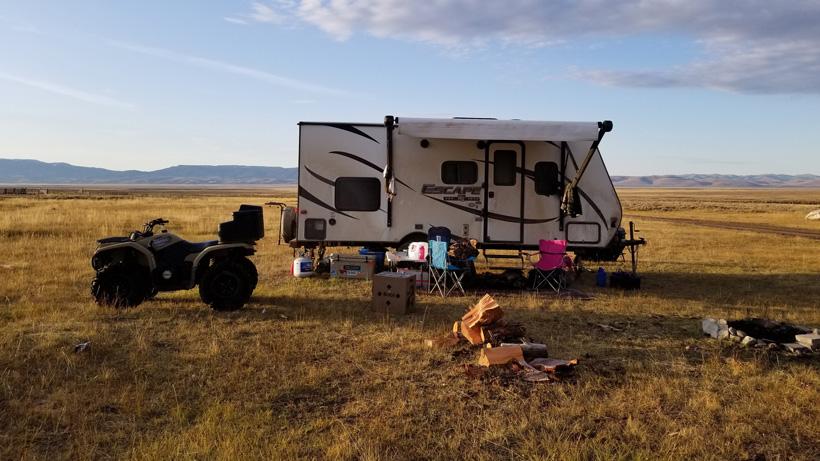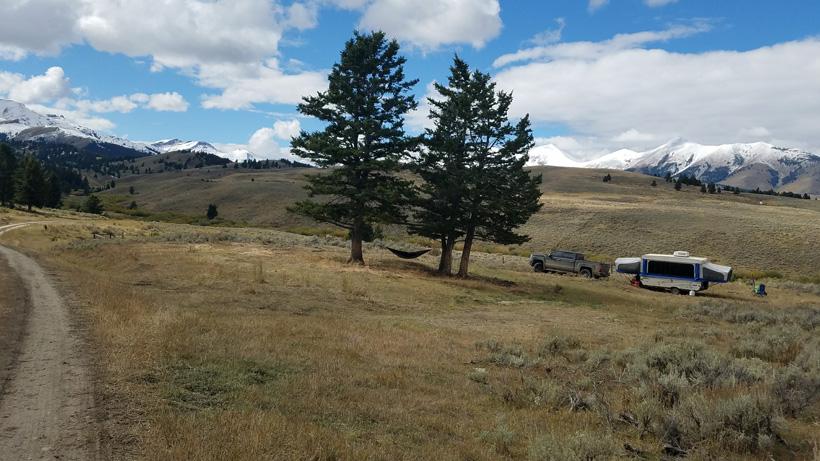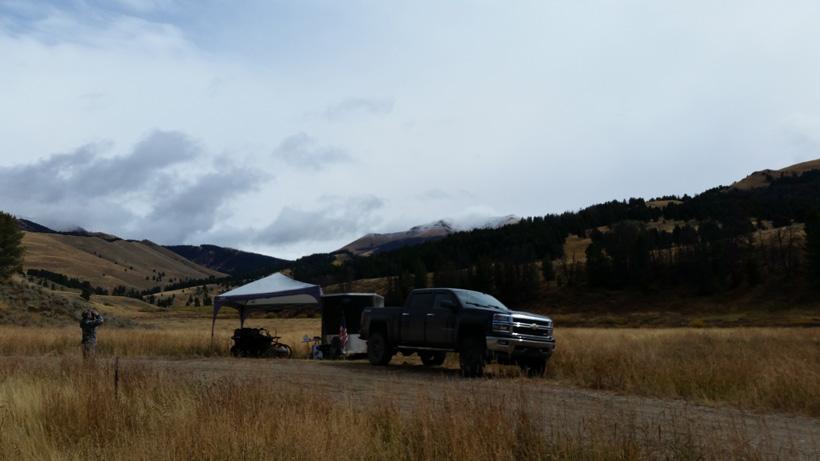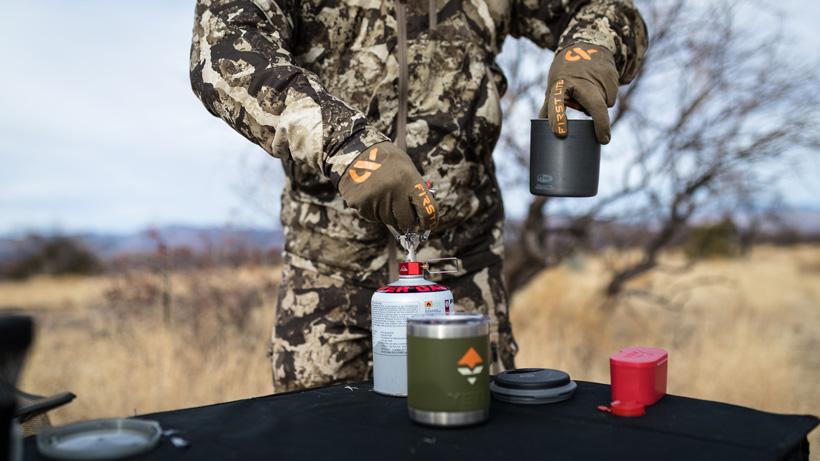




Photo credit: Jake Horton





No matter what species you are hunting you probably have thought about where you are going to sleep on your hunt. Sleep is very important and can truly affect your experience out West no matter if you are hunting the heat of Arizona or the frigid temperatures of Montana. When considering where you are going to spend your nights, it is important to think about your finances, the weather, location, species and, most importantly, your ability and experience. All of these topics and more influence where you stay the night and what is the best decision for you. Some people are minimalist and can sleep all night in a hammock five miles deep in grizzly country with no issues, but not me.
Call me a chicken or unrealistic, but when hunting in grizzly country I would prefer — and typically do — hike five miles deep every day rather than worry about every cracking branch at night. That might not be you and you might be fearless in the backcountry, which allows you to sleep through the night without a second thought. Overall, looking at each topic and being honest with yourself will set the right expectations and, ultimately, make your hunt more enjoyable, especially when you lay down your head for the night.
Photo credit: Jake Horton
The first topic I consider with every hunt experience is finances. Being a married man, my financial decisions always start and end with talking through the finances with my wife and getting her approval. Finances are a super important part of being able to go hunting every year so every big purchase is talked over and budgeted for in advance. It is important to understand and think about how much you are willing to spend on your sleeping quarters. Can you afford to buy a camper or a pop-up camper? Does that work with your hunt or are you willing to sleep in the bed of your truck or back of an SUV in order to save money? Will you be interested in an ultralight backpacking tent or a hammock or do you need to plan on getting a wall tent packed into your hunting areas on the backs of horses? What are the costs associated with all of these styles and how does that fit into your budget? Some things require sacrifices or long-term planning in order to make your experience align with the one you are after. After you look at the financial portion and come up with options, you need to analyze the weather where you will be hunting during the time of year you plan to be there.
Weather is an interesting part of hunting and can completely change your experience. Planning for the worst will make your hunt have an opportunity to be the best. It is important to plan each hunt differently in advance and be OK with last minute changes as they come up. For example, if I am rifle hunting in the high country of Colorado during the fourth rifle season I expect it to be frigid. Now, this doesn’t always happen, but when it does, I am glad I have the right gear. Do the sleeping quarters I am planning on work during those weather conditions? If it rains, will I be off the ground enough to not have my tent flooded? Does my tent need a floor if it rains? Do I have a sleeping bag for the cold weather that are lightweight enough to pack into my spike camp? Though the weather in the high country is unpredictable, it is important to do your best to imagine the worst case scenario. Some of my best elk hunts come a day after the high country dumped its first 8” of snow on the ground. If I wasn’t prepared then, I would be back at the truck trying to dry out my gear and missing some great opportunities.
When you are thinking about the species you are hunting it has more to do with the location where your hunting species live than anything else. Some animal species live in the remote areas that need you to be 10 miles from a trailhead or 3,000’ or 4,000’ vertical above the trailhead. When this happens, you do not have a choice but to camp in the backcountry. If hunting an animal such as bighorn sheep that live on the steepest peaks, physically, you do not have a choice to base camp and, instead, need to camp with some elevation already gained out of a packed in camp or a tent. With a species like that you just need to understand that unless you are superman or superwoman, you typically, physically, can’t be day hunting out of a trailhead for bighorn sheep without horses. Other species like elk or mule deer are location dependent. Some drainages or wilderness areas almost require you to bivy camp in the backcountry if you plan on hunting every morning and evening and be into elk or mule deer by first light.
People who day hunt from the trailhead are way behind or worn out by the time they wake up listening to bugling bulls near their bivy camp. There are several places I hunt that only require a two to three mile hike into the elk habitat so I choose to stay in a camper, get a good night’s sleep and make a pot of coffee every morning, but this is not always the case. For this specific elk hunting spot, I choose to do this because even though I have to get up 45 minutes to an hour earlier I hunt every morning and every night and sleep like a baby. This makes my hunting experience more enjoyable for me.
The most important thing to think about above all else when deciding whether you will stay at a base camp in a camper, truck or tent or if you plan to hike in and bivy camp in a sleeping bag, tent or hammock is your ability and experience. Can you physically hike in four to five miles every morning and hunt every day or do you need to stay in the backcountry in order to have your best chance? Are you OK with this decision or is it not something you want to do? Not everyone can physically carry a camp on their back and you might need to hunt one to two miles from a truck or camper to have the best experience. If that’s the case, then choose to do that! Your backcountry experience level is important to decide where and how you will camp as well. If you are in bear country, do you know the best way to store your food? If the weather is going to be raining, do you have the gear to keep you dry and to get out of bed? It’s important to be honest with yourself because it sounds like a great idea to sleep deep in the wilderness, but not everyone is going to enjoy that experience. Think twice and have a great hunting experience, especially when it comes to sleeping.
It is important to think through the situation for every hunt you plan to go on as well practice for it if you can. If it is your first time with new gear or a new setup, then you owe it to yourself to take a summer practice hike two miles in and spend the night. Learn what feels right or wrong and decide what gear you need to make the experience what you want it to be. Hunting, in general, is usually a great experience to look back on but can be brutal on your body, mind and spirit during the act. Over preparing mentally, with gear, and physically can make the difference. Sleep is also crucial so do what is best for you in order to have a great experience. Don’t be afraid to change it up or spend a night in a hotel during your hunt to reset. It’s all about your experience so make it what you want it to be. Good luck this fall.